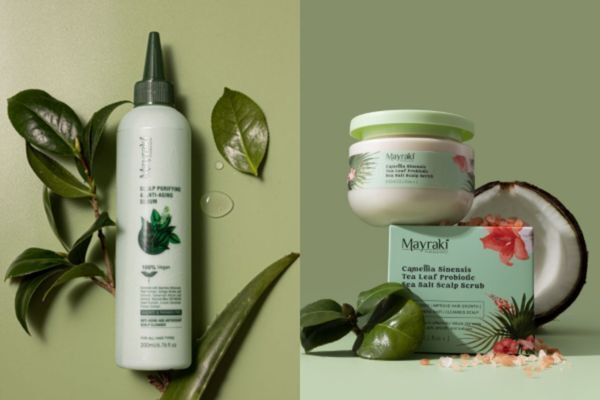How to Prevent Dandruff in Winter
Nov 26, 2025 | By Edss Tolentino

When the cold months roll in, many people notice an unwelcome guest. Dandruff , that seems to get worse with every chilly breeze. Dry indoor heat, low humidity, and heavier hair products can all throw your scalp off balance. It leads to flakes and itchiness that are hard to ignore. But here’s the good catch: dandruff prevention winter doesn’t have to be complicated. With the right routine and a few simple adjustments, you can keep your scalp healthy, hydrated, and flake-free all season long.
Why Dandruff Worsens in Winter?
Dandruff often worsens in winter because your scalp’s natural balance takes a hit from the dry indoor air, and changes in your daily routine. Let’s unpack what’s really going on:
-
Dry Air & Indoor Heating
When the temperature drops, low humidity effects and indoor heating dryness strip your scalp of much-needed moisture. This disrupts your moisture barrier that causes scalp flaking, scalp irritation, and tightness. Think of it like your skin, just as your hands feel dry and cracked in winter, your scalp’s barrier lipids can weaken too. You can boost scalp hydration with nourishing oils and shampoos.
-
Cold Winds
That biting winter wind damage doesn’t just chill your face but it also stresses the scalp. The cold air constricts blood vessels, slowing nutrient delivery and affecting skin desquamation. This can lead to rough patches and more visible flakes. Protect your head with a breathable hat and try essential oils for scalp care, like tea tree or rosemary, to soothe and strengthen your scalp’s surface.
-
Less Natural Oil Distribution
In summer, you sweat more, helping distribute your scalp’s natural oils evenly. But in winter, sweat production drops, and your scalp can become dry and unevenly moisturized. This lack of natural oil flow can trigger conditions like seborrheic dermatitis, which leads to oily flakes and redness. Incorporate gentle cleansing with an antifungal shampoo once or twice a week to manage excess yeast without stripping the scalp of its natural oils.
-
Overwashing or Hot-Water Damage
Hot water dissolves protective oils and disturbs pH balance scalp, which can worsen dryness and dandruff. Overwashing, especially with harsh shampoos, further breaks down the moisture barrier. It makes your scalp more prone to irritation and flaking. Switch to lukewarm water and limit shampooing to every 2–3 days. Try adding scalp exfoliation once a week to remove buildup and improve product absorption.
Anti-Dandruff Winter Tips
Between low humidity effects, indoor heating dryness, and harsh winds, your skin’s natural defenses weaken. It can lead to dry scalp in winter, itching, and flakes that just won’t quit. With the right anti-dandruff winter tips, you can easily prevent dandruff in cold weather and maintain a comfortable scalp all season long. Here’s how to give your winter hair and scalp the care they deserve:
1. Gentle Cleansing
Cold weather can make your scalp extra sensitive, so gentle cleansing is key to maintaining your pH balance scalp and moisture barrier. Wash your hair 2–3 times a week to avoid stripping away natural oils. Then choose mild shampoos or an antifungal shampoo with zinc or ketoconazole to help manage seborrheic dermatitis and reduce scalp flaking. Avoid sulfates and harsh detergents that cause scalp irritation and dryness.
2. Avoid Very Hot Water
As tempting as it is to take a steaming shower, hot water can damage your scalp’s barrier lipids and worsen itchy scalp winter problems. Instead, use lukewarm water to protect your scalp hydration and natural oils. Overly hot showers can accelerate skin desquamation, making flakes more visible and your scalp more irritated.
3. Scalp Exfoliation

Exfoliating your scalp once a week removes dead skin and buildup that can block moisture and nutrients. Scalp exfoliation is especially beneficial for cold weather scalp care, as it promotes better absorption of treatments. Try a gentle scrub or chemical exfoliant made for the scalp. Avoid harsh scrubs that could cause micro-tears or worsen winter scalp care issues. After exfoliating, always follow with a hydrating treatment to restore balance.
4. Use Scalp-Friendly Ingredients
In winter, it’s important to choose ingredients that nourish rather than strip. Some of the best dandruff prevention tips include using formulas packed with:
- Tea tree oil - A natural antifungal that helps calm inflammation and prevent dandruff in cold weather.
- Zinc or ketoconazole - Clinically proven ingredients in antifungal shampoo for controlling seborrheic dermatitis.
- Essential oils for scalp - Like rosemary, jojoba, or argan oil to support scalp moisture in winter.
5. Moisturize Your Scalp
Moisturizing helps restore the moisture barrier and prevent dry scalp in winter. Apply a light, leave-in oil or serum to lock in moisture. Focus on natural oils that mimic your scalp’s sebum, like argan or jojoba. Avoid heavy, pore-clogging products that can trap flakes.
Scalp-Soothing Treatments & DIY Options for a Flake-Free Winter
- Lightweight Oils or Serums
A nourishing oil or serum can work wonders for maintaining scalp hydration and a strong moisture barrier, especially when your skin feels tight or irritated. Choose lightweight, non-comedogenic options that absorb quickly without greasiness.
-
Hydrating Scalp Mask Recipes
DIY scalp masks can deeply moisturize and help prevent dandruff in cold weather. These treatments support scalp moisture in winter while reducing scalp flaking and discomfort from itchy scalp winter conditions. Try these easy mask ideas:
- Honey + Yogurt: Boosts hydration, soothes irritation, and supports gentle skin desquamation.
- Coconut oil + Aloe gel: A perfect combo for softening flakes and restoring your moisture barrier.
- Avocado + Olive oil: Rich in fatty acids that nourish and strengthen winter hair and scalp.
-
Overnight Scalp Care
For deep nourishment, an overnight scalp treatment can help combat dry scalp in winter and reinforce your cold weather scalp care routine. Choose light, non-comedogenic oils that allow your scalp to breathe while hydrating overnight.
Dandruff Prevention Winter
Here’s a simple, effective weekly plan to help you prevent dandruff in cold weather and keep your scalp calm, clean, and hydrated all season long.
1. Mild Cleansing
In cold weather, overwashing can worsen scalp irritation and dryness, but not cleansing enough can lead to buildup and scalp flaking. Use a mild or antifungal shampoo containing zinc pyrithione or ketoconazole to control seborrheic dermatitis. Additionally, choose formulas enriched with essential oils for scalp health. Focus on maintaining your pH balance scalp to support a strong barrier and long-term scalp hydration.
2. Scalp Exfoliation
A once-weekly scalp exfoliation removes dead skin, product residue, and excess oil that can block follicles and trigger winter dandruff. Apply a gentle scrub or exfoliating serum formulated for cold weather scalp care. Avoid harsh grains or rough particles that can aggravate scalp irritation. Moreover, follow up with a light, hydrating conditioner or oil to replenish your barrier lipids.
3. Hydrating Scalp Mask
Cold air and heating systems can easily strip your scalp of moisture, so hydration is crucial for dandruff prevention. Try a hydrating scalp mask made with aloe, honey, or natural oils like jojoba or argan to boost scalp moisture in winter. Let it sit for 10–15 minutes to deeply nourish the scalp and reinforce your moisture barrier.
Wrap-Up

Dandruff prevention winter care is all about consistency, balance, and understanding what your scalp truly needs. By keeping up with gentle cleansing, regular hydration, and mindful product choices, you can protect your scalp’s moisture. You can stay flake-free even through the driest months. Stay observant, adjust as needed, and your scalp will thank you with lasting comfort and confidence. Ready to take your routine further? Explore Mayraki’s nourishing scalp care line and discover products designed to keep your scalp healthy, hydrated, and dandruff-free all winter long.




